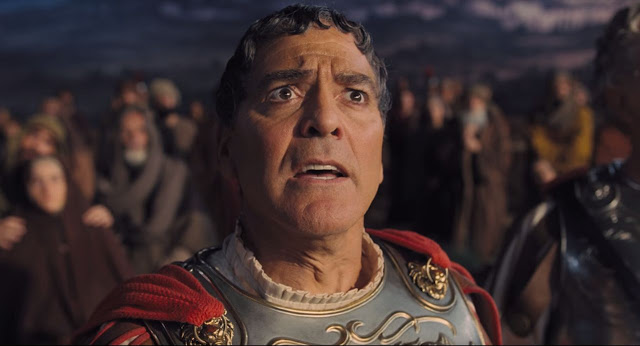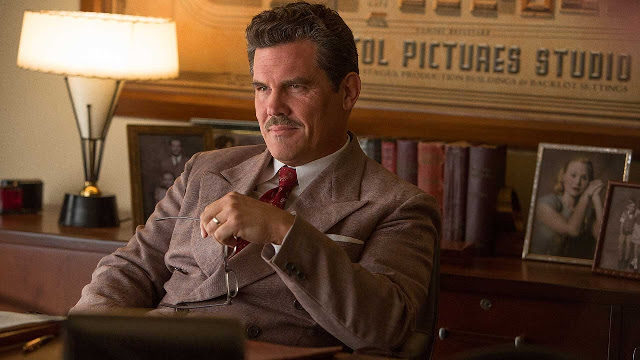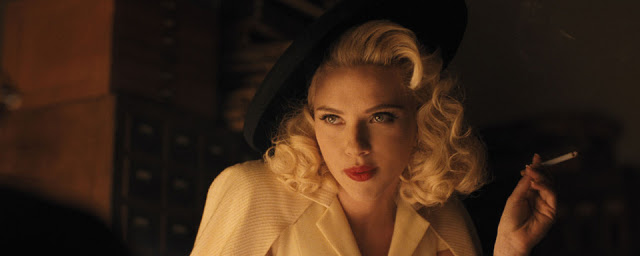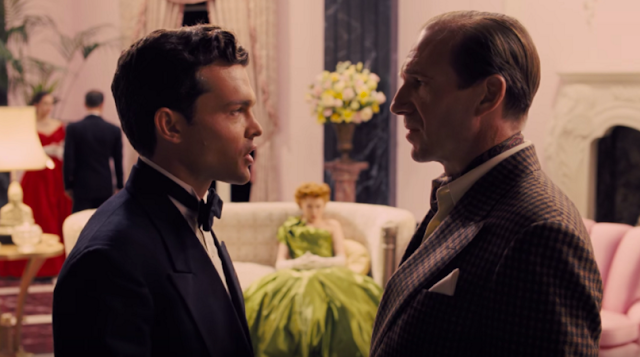There is quite a bit going on in the latest eccentric movie by Joel and Ethan Coen, beginning with its title. It is called Hail, Caesar!, and it is about the making of a sword-and-sandal epic called Hail, Caesar!, which comes complete with a subtitle, “A Tale of the Christ.” Students of Hollywood history will recognize that caption as the same one affixed to Ben-Hur, the Charlton Heston-starring colossus that seized 11 Oscars in 1959, but the Coen Brothers are interested in more than just nostalgic homage. Early in Hail, Caesar!—the real one, not the fake one, though it is occasionally difficult to distinguish the two—producer Eddie Mannix (Josh Brolin, fighting trim) assembles a quartet of religious cognoscenti and beseeches them to tell him if the script for his big-budget behemoth could possibly offend members of their respective faiths. This leads to a predictably funny whirligig of insults and confusion—the rabbi in attendance is constantly denigrating the views of his Christian brethren, while the minister insists that the film’s chariot-jumping scenes are narratively dubious—but the on-screen collision between religion and cinema is hardly incidental. For the Coens, filmmaking isn’t just a vocation. It’s God’s work.
But what about for Eddie? As Hail, Caesar! opens, he is experiencing a crisis of faith, one that has him rushing to the confessional at regular 24-hour intervals. Eddie is the fixer for Capitol Pictures, one of those titanic Old Hollywood studios that churns out star-powered, machine-authorized hits in the vein of Cecil B. DeMille blockbusters, Busby Berkeley musicals, and John Ford westerns (plus plenty of junk, too). He’s wrung out, exhausted from the endless hours and disturbed by the seedier aspects of his job. That doesn’t stop him from working. After we first see him unburdening himself to an apathetic priest, he hightails it to the Hollywood Hills and slaps around one of his stars, berating her for posing for naughty photos (the studio owns her glamorous likeness, you see) and sending her to rehab to dry out. Then it’s off to the back lot to wrangle obstinate directors, soothe haughty starlets, and divert nosy gossip columnists, the latter of whom are always sniffing out the latest scandal. This is to say nothing of the pictures themselves, many of which are behind schedule; when Eddie finally finds a moment to review the most recent dailies of Hail, Caesar!, he discovers that one of its major set pieces is interrupted by a title card reading, “Divine Presence to be shot.”
It’s enough to drive a man to drink or, in Eddie’s case, to cigarettes. So when you eventually learn that he’s being courted by a suit at Lockheed, promising him a cushy middle-management position with a comfortable salary and a lack of stress, you might wonder why he’s even thinking twice. But Eddie is loyal, an acolyte of the majesty of motion pictures, and the Coens frame his struggle not as a simple choice between employment opportunities but as an agonizing decision over the potential sale of his soul. Or, as it was put in one of the Harry Potter films by Michael Gambon—the great English actor who narrates Hail, Caesar! in his sonorous diction—it’s a choice “between what is right and what is easy”. Making movies is hard, but Eddie believes in it.
So do the Coens. But while Hail, Caesar! functions ably as both a tribute to and a send-up of classic Hollywood pictures—it is simultaneously pious and irreverent—it is far from the most persuasive defense of cinema the brothers have mounted. That’s because, while the Coens prove expectedly adept at mocking the false grandeur of old studio films, they seem to have neglected the requirement of making an interesting movie themselves. Hail, Caesar! is consistently funny and fitfully delightful, but it doesn’t really amount to much. The primary storyline, beyond Eddie’s internal battle, involves Baird Whitlock (George Clooney), the megastar headlining Hail, Caesar! who is kidnapped by communists and held for ransom. This should result in uproarious comedy—team a deceptively self-aware star like Clooney (appearing in his fourth film for the Coens) with some sharp scene-stealers like Max Baker, David Krumholtz, and Fred Melamed (who starred in A Serious Man, the Coens’ most overt examination of religion), and the laughs ought to write themselves—but it falls curiously flat. That’s true of Hail, Caesar! as a whole. For a duo so typically attuned to the details of screenwriting—recall their brilliantly plotted debut Blood Simple, or the exacting storytelling of Fargo—the Coens’ script here is oddly thin, with a feeble ending that results in a strange sensation of emptiness.
But if the bolder strokes of Hail, Caesar! are lackluster, its scene-by-scene pleasures are bountiful, as well as proof that casting still counts. This is a superbly well-acted movie, laden with talent, but while the A-listers are all hits—Scarlett Johansson in a mermaid costume! Frances McDormand as a chain-smoking editor! Tilda Swinton as competing twin gossipmongers wearing matching feathered hats!—the revelation is relative newcomer Alden Ehrenreich. He plays Hobie Doyle, a twangy Roy Rogers cowboy who suddenly finds himself cast against type as the lead in a posh romance being directed by the marvelously named Laurence Laurentz (Ralph Fiennes, and remember what I said about perfect casting?). In the film’s single funniest scene, Laurentz strives to coach Doyle in the finer points of line reading, with painful and hysterical results.
Yet while the winks and the nudges come fast and furious, Hail, Caesar! arguably works best when it’s playing things straight. In order to lampoon the so-called Golden Age of Hollywood, the Coens are obligated to recreate it, and they’ve done a wondrous and convincing job. Some of this movie’s most purely enjoyable scenes occur when Eddie wanders from set to set, checking in on his various crowd-pleasing properties. And so, we’re treated to an aquatic spectacle in which Johansson is elevated high above a troupe of synchronized swimmers, all twirling in perfect time to the music of a live orchestra. There’s also a jaunty song-and-dance tap featuring Channing Tatum as a lovelorn sailor, an infectious number that charms with its rhythm and choreography. Even the brief glimpses we see of Hobie Doyle’s westerns seem splendid, with well-trained horses and crafty stunt work. There is undoubtedly a layer of irony coating these sequences, but their impressive execution nonetheless suggests the Coens could have made a damn fine old-Hollywood studio picture, if they’d been so inclined.
They haven’t, of course. Unlike their last movie (the magnificently bittersweet Inside Llewyn Davis), this one is modern and meta, insistently elbowing you with its cleverness. But though Hail, Caesar! serves as accomplished satire, it feels more cunning than cutting, a cute concept that isn’t quite fully formed. As such, it lacks the clarity and singular vision that characterize some of the Coens’ best comedies: the anarchic imagination of Raising Arizona, the screwball zip of Intolerable Cruelty, the sheer mania of The Big Lebowski. (Certainly it comes nowhere close to the jagged soulfulness of Barton Fink, the movie’s closest analogue in terms of exposing Hollywood dysfunction.)
At one point in Hail, Caesar!, Eddie passionately defends the motion picture industry, arguing that it can bring joy to people everywhere. He’s not wrong, and the Coens clearly take their craft seriously, even when they’re having so much fun. But while Hail, Caesar! mostly works as a hymn to the movies, it’s no less frivolous a movie itself. That divine presence is still out there somewhere, waiting to be shot.
Jeremy Beck is the editor-in-chief of MovieManifesto. He watches more movies and television than he probably should.





